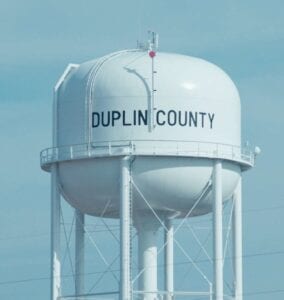Water & Sewage
On-site evaluations/permits/inspections
This office conducts on-site evaluations of proposed home sites to determine the suitability of the soil for an on-site  sewage disposal system. An application is made with this office for an improvements permit. A plot plan is required to be furnished, which indicates the size of the lot that is to be evaluated, the size and location of the proposed dwelling, the size and location of any adjacent structures and future development, and the location of any wells or existing septic systems.
sewage disposal system. An application is made with this office for an improvements permit. A plot plan is required to be furnished, which indicates the size of the lot that is to be evaluated, the size and location of the proposed dwelling, the size and location of any adjacent structures and future development, and the location of any wells or existing septic systems.
The size of septic systems are based on the number of bedrooms in a dwelling, the number of employees in a business, and the number of seats in a restaurant or a church. This information must be furnished to this office when the application is made.
After the above information is obtained, an Environmental Health Specialist visits the site to conduct a site evaluation. When determining the site suitability, the following factors are taken into account:
- Topography and landscape position: shape and slope of the lot (ex. hill or depression)
- Soil characteristics (morphology): texture-relative proportions of sand, silt, and clay size particles of the soil. The textures are arranged into four general groups containing twelve textural classes ranging from sand to clay.
- Structure: the arrangement of the soil particles
- Soil wetness conditions: location of the seasonal high water table or perched water table, and is determined by observation of colors of chromo 2 or less using the Munsell Color Chart.
- Soil depth: the amount of suitable soil before an unsuitable factor such as rock or saprolite.
- Restrictive horizons: soil that is capable of perching ground water or sewage effluent. They are commonly referred to as hard pans and usually found in areas like bays.
- Available space: amount of suitable soil that can be used for the septic system and repair area.
After the site evaluation is completed, a classification is given to the site. A suitable classification means that a conventional system can be installed with out any modifications to the site. A provisionally suitable classification means that an on-site system can be installed, with modifications being made to the site, or to the system design. An unsuitable classification means that a septic system cannot be installed to meet the required rules and regulations, and the site is denied a septic system permit.
After the lot has been classified by the above categories, a permit is either issued or denied. If a permit is issued, a diagram is provided to the applicant, along with the improvements permit, indicating exactly where the septic system should be installed.
A final inspection is required after the septic system installation is completed, so the operation permit can be issued and the system can be placed into use.
Application for Existing Tank Inspection
Application for Expansion-Revision-Site Location
Application for Improvements (New) Permit
Application for Repair Permit
Sewage Violations
Frequently Environmental Health is called to inspect possible violations of sewage disposal. These may range from kitchen waste being piped to an open ditch, to a direct discharge pipe from the septic tank or toilet to a ditch or yard. After making an inspection, and determining the validity of the complaint the appropriate action is taken. If the violations are not corrected in the specified amount of time, criminal warrants may be issued.
Well Permitting
Duplin County is one of a growing number of counties in North Carolina that has a well ordinance. This means that all new well sites in the county must first be approved by this office. This helps to insure that wells are located the required setback distances from all sources of contamination and are constructed according the standards required by the state. After a well permit is obtained and the well has been drilled, the well contractor will contact this office for a grouting inspection. This inspection is to make sure that the well has been placed in the proper location, and to verify that the cement grout has been placed at the proper depth and mixed to the correct specifications.
Application for Private Drinking Water Well
Application for an Irrigation Well
Water Sampling
Many residents of Duplin County depend on private wells for their water supply. Often times these people rely on this department to sample their water when there is an unexplained illness, the water tastes or smells bad, or as a requirement for a real estate transaction. Samples are collected by our office for a fee, and are analyzed by the Environmental Sciences Section of the State Laboratory of Public Health in Raleigh. The most common samples that are taken are for bacterial and chemical analysis.
Application for Well Water Testing
Bacterial sample: (Total and Fecal Coliform)
The Total Coliform test has for decades been considered the primary indicator of the bacteriological suitability for drinking water. The coliform group consists of four genera of bacteria-Enterobacter, Klebsiella, Citrobacter, and Eshericihia. The presence of Total Coliforms indicate that the water is unsafe to drink.
Fecal Coliform is a subgroup of Total Coliform and a term that is frequently used synonymously with E. Coli. The presence of Fecal Coliform bacteria indicates the recent introduction of bacteria from the intestinal tract of warm blooded animals. Anyone drinking water which is contaminated with Coliform Bacteria would also be at risk of ingesting any pathogenic organisms that may be present.
The chemical analysis tests for the levels of alkalinity, arsenic, calcium, chloride, copper, hardness, lead, iron, magnesium, manganese, pH, fluoride, zinc in the private water supply.

